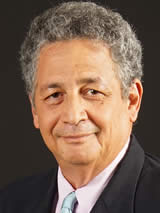Message from the University/Campus Director of SALISES
 It gives me great pleasure, as University Director of the Sir Arthur Lewis Institute of Social and Economic Studies (SALISES), to welcome you to this very important conference on Population Issues and Dynamics in Trinidad and Tobago: Theory, Practice and Policy for the Post 2015 SDGs. This conference deals with the causes and consequences of phenomena associated with the wellbeing of human beings as individuals and as groups, whether at the level of households, communities, myriad social groups and a national society as a whole. It transcends the purely scholarly enterprise usually associated with great Universities like the University of the West Indies, of which the SALISES has been an integral part since the establishment of University College of the West Indies in 1948. It deals with an issue that is requiring attention worldwide and, in particular, in the wider Caribbean region served by this University. It is intended to add to the stock of knowledge that contributes to the sustainable development of Trinidad and Tobago and, by extension, the entire Caribbean region.
It gives me great pleasure, as University Director of the Sir Arthur Lewis Institute of Social and Economic Studies (SALISES), to welcome you to this very important conference on Population Issues and Dynamics in Trinidad and Tobago: Theory, Practice and Policy for the Post 2015 SDGs. This conference deals with the causes and consequences of phenomena associated with the wellbeing of human beings as individuals and as groups, whether at the level of households, communities, myriad social groups and a national society as a whole. It transcends the purely scholarly enterprise usually associated with great Universities like the University of the West Indies, of which the SALISES has been an integral part since the establishment of University College of the West Indies in 1948. It deals with an issue that is requiring attention worldwide and, in particular, in the wider Caribbean region served by this University. It is intended to add to the stock of knowledge that contributes to the sustainable development of Trinidad and Tobago and, by extension, the entire Caribbean region.
The SALISES has its roots in The Institute of Social and Economic Research (ISER); established in 1948 in Mona, Jamaica, which established a tradition of inter-disciplinary and multi-disciplinary research, showcased in its many publications, in particular in its flagship scholarly journal, Social and Economic Studies (SES). With the establishment of a branch of the ISER on the St. Augustine Campus in 1970, the Institute continued to evolve in accordance with this proud tradition. With the establishment of SALISES in 2000, the spirit of ISER was broadened to incorporate graduate teaching while forging ahead with its research focus albeit directed towards development policy.
SALISES staff has continued to establish the Institute as the premier centre for research pertaining to Caribbean development policy on a global scale. The Institute continues to publish SES on a quarterly basis and is also associated with the publication of the Journal of Eastern Caribbean Studies and Caribbean Dialogue. SALISES has been gaining prominence during the first two decades of the 21st century, largely through the academic, scholarly and public service contributions of its staff and in particular, the fact that it continues to host successful annual conferences that have attracted regional and international participants since 2001.
In 2012, in recognition of the 50th Anniversary of Independence for Jamaica and Trinidad and Tobago, the SALISES established a programme of scholarly, policy-oriented research, called the 50-50 Initiative. This initiative resulted in the formation of a number of subject-matter research clusters geared towards studying contemporary and prospective development challenges in the Caribbean Sub-Region. The Caribbean Research Cluster for Population and Sustainable Development is one such cluster, inspired by the work and vision of Dr. Godfrey St. Bernard, Senior Fellow in SALISES, St. Augustine and Co-ordinator of the Master of Science in Development Statistics.
As University Director of SALISES, I have often expressed my pleasure with this programme and its contribution towards institutional strengthening for professionals who aspire towards professional activities within the realm of development policy in small developing states, including those in the Caribbean. Apart from Dr. St. Bernard, several graduates of the Master of Development Statistics will be presenting formal papers at this conference. A detailed review of the conference programme reveals that the conference is informed by truly inter-disciplinary and multi-disciplinary insights consistent with the ideals of SALISES.
In concluding, it gives me great pleasure to welcome you to another high quality event convened by SALISES. In addition to thanking SALISES Administrative Staff, including Ms. Francine Alleyne, Mr. Sheldon Warner, Ms. Cathy Modeste and Mr. Ephraim Thompson, I also wish to thank, for their overwhelming contribution towards organizing this conference, Dr. Godfrey St. Bernard (SALISES Senior Fellow) and his team consisting of Ms. Anita Davis, Colette Hosten and SALISES Alumnae: Ms. Taresa Best-Downes, Ms. Hyacinth Blake and Ms. J. John. I look forward to a successful venture that no doubt will set the tone for other country-specific ventures that being planned by Dr. St Bernard and his team in other Caribbean jurisdictions.
Professor Patrick Watson
University/Campus Director
Sir Arthur Lewis Institute of Social and Economic Studies
The University of the West Indies
St. Augustine

